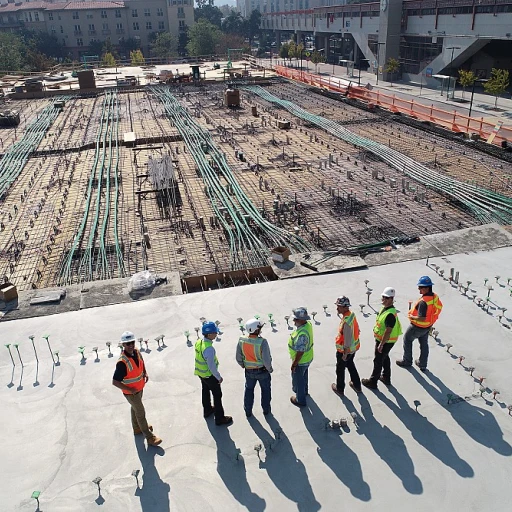
Understanding the Role of a Supervisor
Exploring the Essentials of the Supervisor Role
Understanding the core responsibilities and skills required for a supervisor is crucial when crafting interview questions. A supervisor plays a pivotal role in managing teams and ensuring effective communication among team members. Their ability to lead, solve problems, and facilitate a positive work environment directly impacts the performance and satisfaction of their team. Here are key aspects to consider:- Team Management: Supervisors must ensure the team operates efficiently and collaboratively, addressing any conflicts to maintain harmony and productivity.
- Decision Making: A supervisor’s responsibility involves making critical decisions that can affect the team and organizational goals. Effective decision making is vital for overcoming obstacles and achieving desired outcomes.
- Communication Skills: Open communication and the ability to convey information clearly are crucial for supervisors to build strong relationships with team members and the hiring manager.
- Leadership and Development: Supervisors should foster career growth for team members, providing the necessary support and mentorship to develop their skills and advance within the organization.
- Customer Service Supervision: In environments where customer interaction is required, the ability to manage and elevate team performance directly affects customer satisfaction.
Crafting Questions to Assess Leadership Skills
Crafting Inquiries to Gauge Effective Leadership
In a supervisor interview, it's crucial for hiring managers to assess the leadership skills of candidates. A supervisor plays a pivotal role in guiding team members, ensuring efficient team management, and maintaining a positive work environment. To uncover a candidate's aptitude for leadership, pose questions that reveal their experiences and strategies in leading a team.
Here are some pointed interview questions that can illuminate a candidate’s leadership capacity:
- How have you demonstrated leadership in your current or previous role? This question prompts candidates to provide specific examples of their leadership skills in action, offering insights into how they can contribute to the job performance expectations.
- Describe a time when you had to lead a team through a significant change. What strategies did you use? Change management is a crucial aspect of team leadership. Understanding a candidate's approach to guiding a team through transitions highlights their adaptive and strategic thinking capabilities.
- Can you give an example of a conflict with a team member and the steps you took to resolve it? Navigating team dynamics demonstrates problem-solving and interpersonal skills, both essential for a service supervisor to maintain team cohesion.
- How do you encourage open communication among team members? Encouraging open communication ensures that team members feel heard and valued, fostering a positive team environment. Candidates' answers will reveal their commitment to nurturing a culture of transparency and trust.
By carefully selecting questions designed to gauge leadership abilities, those involved in the hiring process can better assess whether a candidate possesses the necessary skills to lead a successful team. Understanding these dynamics is key to making sound hiring decisions and investing in the right team leadership.
To further explore interview dynamics and question strategies, you might consider reading more about navigating the dynamics of panel interviews.
Evaluating Problem-Solving and Decision-Making Abilities
Assessing Problem-Solving and Decision-Making Capabilities
In any supervisor role, the ability to navigate challenges and make informed decisions is paramount. In the interview process, asking targeted questions can uncover how adept candidates are at solving problems and making decisions under pressure. It's vital to explore their practical experiences, especially in scenarios where their problem-solving skills were tested. When planning supervisor interviews, consider these types of questions to unearth the candidate's suitability:- Problem-Solving Scenarios: Ask candidates to describe a time when they faced a major obstacle at work. Encourage them to discuss the steps they took to resolve this issue and what the outcomes were. This question not only reveals their problem-solving skills but also their ability to remain proactive and composed under pressure.
- Decision-Making Situations: Inquire about a difficult decision they made in their past roles that had significant implications on their team or project. Understanding the reasoning behind their decision process can give insight into their capacity to balance logic, strategy, and empathy in difficult situations.
Assessing Communication and Interpersonal Skills
Exploring Communication and Interpersonal Dynamics
The ability to effectively communicate and maintain positive interpersonal relationships within a team is crucial for any supervisor role. During a supervisor interview, hiring managers often explore these skills to ensure that the candidate can lead a team with open communication and positive work environment. When preparing questions for this part of the interview process, consider focusing on scenarios that reveal the candidate’s team management skills. Here are a few effective approaches:- Evaluate Communication Skills: One common way to assess communication skills is by asking the candidate to describe a time when they had to relay difficult information to a team member. Analyze their answer to see how they handled the situation and maintained respect and clarity.
- Assess Team Interaction: Inquire about experiences where the candidate had to mediate conflict between team members. Their response will showcase their ability to maintain team harmony and ensure team performance even during challenging times.
- Discuss Collaboration Experience: Ask how they have previously collaborated with other departments to achieve a company goal. This question can reveal how well they work across different teams and can enhance overall team effectiveness.
Understanding the Candidate's Vision and Strategy
Exploring the Candidate's Vision and Strategy for the Supervisor Role
In a supervisor interview, learning about the candidate's vision and strategic thinking is essential. This aspect of the interview process provides invaluable insights into how they envision their role, manage their team, and their approach towards achieving the organization's goals. Here are several key areas to consider:- Long-term Goals: Ask questions about their long-term goals for the team. The way they picture the future can reveal a great deal about their priorities and foresight.
- Team Management: Inquire about their strategies for team management. An effective supervisor should have plans in place to ensure team members are motivated and performing at their best.
- Performance Improvement: Discuss how they intend to handle performance reviews and improvements. A successful candidate will have strategies tailored to enhancing team performance while fostering a positive work environment.
- Adapting to Change: Understand how they approach adapting to changes within the work environment and the broader industry. Flexibility and forward-thinking are critical skills in a supervisor.
Ensuring a Positive Candidate Experience
Creating a Supportive and Transparent Interview Process
In the journey of discovering the right supervisor for your team, ensuring a positive candidate experience cannot be overstated. This phase of the hiring process is crucial not just for the candidates, but also for you, the hiring manager, as it reflects on your organization's values and work culture.- Open Communication: From the outset, clarity in communication is key. Candidates should receive a clear outline of what to expect during the interview process, including the types of supervisor interview questions they will encounter, how long the interview will last, and who the team members they will meet are. This transparency goes a long way in reducing candidate anxiety and setting the tone for a positive interaction.
- Responsive Feedback: After assessing leadership skills and evaluating problem-solving abilities, providing timely and constructive feedback is essential. Candidates appreciate when organizations take the time to share insights about their performance. This feedback is beneficial for their career development and strengthens their perception of your company’s commitment to fostering growth, even if they don’t fill the role.
- Consistent Experience: Ensure that all candidates have a uniform experience throughout the interview process. This includes maintaining the same set of interview questions for all, which helps in fairly assessing communication and interpersonal skills. Consistency is a testament to your organization's professionalism and fairness.
- Positive Work Environment Evidence: During the interview, highlight aspects of your team’s work environment that demonstrate the organization's culture, such as ways supervisors lead team members or how open communication is encouraged among team members. Sharing success stories or examples of effective customer service driven by supervisors can paint a vivid picture of the positive work atmosphere candidates can look forward to.
- Respecting Time: Always respect the time and effort candidates put into interviews. Start and end interviews on time, and avoid rescheduling at the last minute unless absolutely necessary. Demonstrating respect for their time reflects directly on how you value your team members’ time in everyday work.













